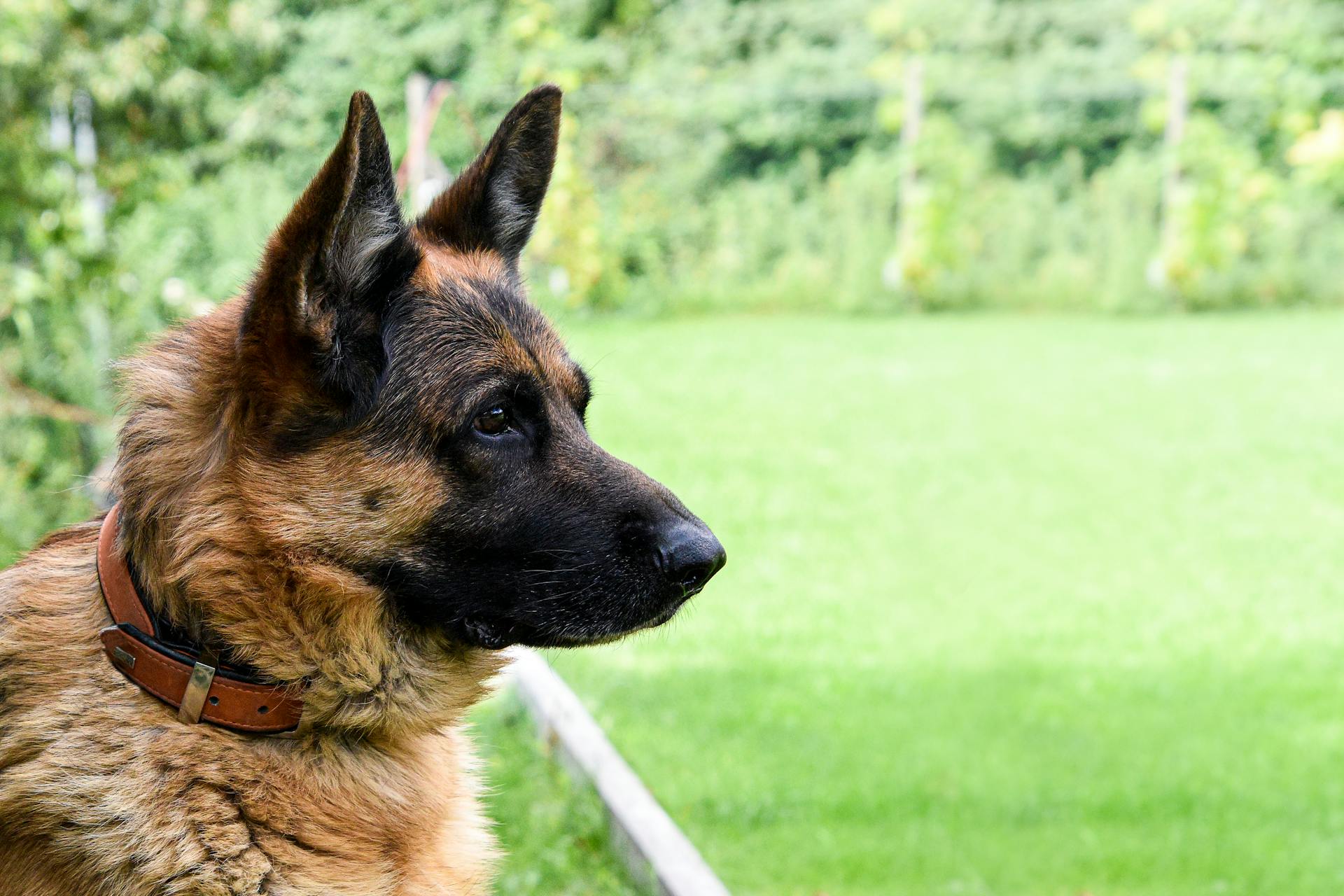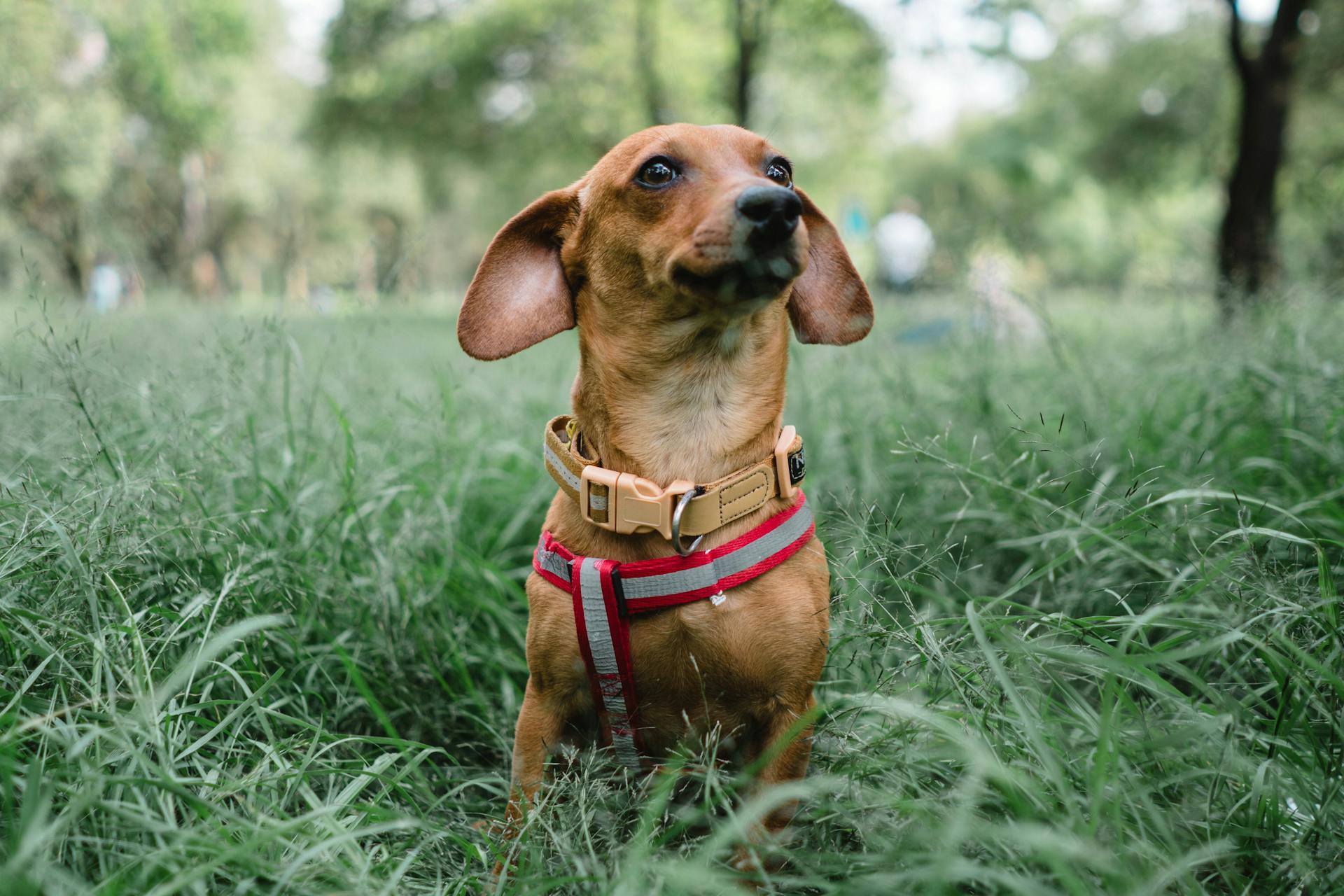
GSDs are naturally protective of their families, which can sometimes be misinterpreted as aggression. This instinctual behavior is deeply rooted in their history as herding dogs.
GSDs are highly intelligent and trainable, but they can be strong-willed and independent. This can make training challenging if not done correctly.
A key factor in understanding GSD aggression is recognizing the importance of proper socialization. A well-socialized GSD is less likely to develop aggression issues.
Proper training, socialization, and exercise can go a long way in managing GSD aggression.
Discover more: Dog Training and Socialization
Understanding GSD Aggression
Aggression in German Shepherds can be a result of a lack of socialization, fear, territoriality, or even health issues.
Understanding the underlying causes of aggression is vital to managing it effectively. German Shepherds, like any other breed, can be prone to aggression due to their intelligence, loyalty, and strong-willed nature.
Here are some common reasons for aggression in German Shepherds:
- Lack of socialization
- Fear
- Territoriality
- Health issues
It's essential to note that aggression in German Shepherds is rarely cured, but often can be controlled with the right approach.
Breed-Specific Traits
German Shepherds are known for their intelligence, loyalty, and sometimes, their strong-willed nature.
Understanding these breed-specific traits is vital in dealing with aggression. German Shepherds are highly trainable, but their strong will can sometimes make training challenging.
Their intelligence and loyalty make them excellent working dogs, often used in police and military roles. This, however, can also contribute to their strong-willed nature, leading to potential behavioral issues.
With proper training and socialization, German Shepherds can thrive and become wonderful companions. Their breed-specific traits should be respected and worked with, not against.
Additional reading: Good Police Dogs
Aggression Toward Family
Aggression toward family members is a serious issue that requires careful consideration and attention.
Dogs that are aggressive toward their family are rarely cured, but they can be controlled with predictable interactions, avoidance of aggression-provoking stimuli, and a good daily routine of exercise, play, and social interaction.
Improvement may occur, but some dogs may continue to be aggressive toward family members, presenting a risk to those who live with them.
Related reading: Family Dog Training
In some households, family composition, daily obligations, and other issues may make keeping and rehabilitating an aggressive dog unrealistic and dangerous.
Euthanasia for aggression may be the only guarantee that a dog will not be aggressive again.
A head collar and leash can be an effective way to control and prevent aggression, even inside the home.
A properly fitted basket muzzle may also be useful in preventing bites and controlling aggression.
The decision to keep an aggressive dog requires constant reevaluation of safety and prevention of bites.
Aggression toward family members is not likely to be related to dominance or social status, but rather to fear, anxiety, conflict, and anticipation of punishment.
Training programs that enforce human family members as alpha or dominance using confrontation or intimidation-based interventions can worsen the aggressive behavior.
Strategies that aim to achieve pack leadership, alpha, or dominance do not address the underlying problem of fear or anxiety and lack of understanding.
Recommended read: Flea Bite on Dog
Understanding Original Purpose
German Shepherds were originally bred to herd sheep and pull carts, which is why they have a strong instinct to work and be productive.
Their original purpose was to assist farmers with their daily tasks, and they took their job very seriously.
This strong work ethic is still present in many GSDs today, but it can sometimes manifest as aggression if they're not given enough mental and physical stimulation.
GSDs were specifically bred to be intelligent and responsive to commands, which makes them highly trainable.
In fact, they were often used as police and military dogs due to their intelligence and loyalty.
Their original purpose also involved working in packs, which is why many GSDs thrive on being part of a family or pack.
This pack mentality can sometimes lead to aggression if they feel their pack is being threatened or if they're not getting enough attention from their pack leaders.
For another approach, see: Dog Bite Work
Causes of Aggression
German Shepherds can develop aggression due to a lack of socialization skills, which is often a result of not being exposed to socialization at a young age. This can lead to difficulties in understanding other dog's body language.
One of the main reasons for poor socialization is not providing enough opportunities for German Shepherd puppies to interact with their littermates and other dogs. This can cause them to struggle with understanding what is and isn't acceptable behavior in social play.
Some common causes of aggression in German Shepherds include poor socialization, territorial behavior, and underlying medical conditions. Identifying the root cause of aggression is crucial in developing an effective training plan.
Here are some common causes of aggression in German Shepherds:
German Shepherds may also become aggressive due to underlying medical conditions, which is why it's essential to have your dog checked by a vet to rule out any potential health issues.
Fear and Anxiety
Fear and anxiety can be underlying causes of aggression in German Shepherds. Fear can be triggered by various stimuli, and gradual exposure to the fear-inducing object or situation might help alleviate the aggression.
One strategy to tackle fear-induced aggression is to use melatonin for dogs as a supplement to calm anxiety, but this should be done under the supervision of a veterinarian.
German Shepherds with fear or anxiety-related aggression may benefit from a calm and gentle approach, rather than a forceful one.
Here's a list of possible causes of fear and anxiety in German Shepherds:
- Fear of other dogs
- Generalized anxiety
In some cases, a simple checkup with a veterinarian can rule out underlying medical conditions that may be contributing to the fear or anxiety.
It's essential to remember that every dog is different, and what works for one German Shepherd may not work for another.
Lack of Socialization
Lack of socialization is a common reason why German Shepherds attack other dogs. This is because they didn't learn the right and wrong ways of dog interaction during their puppyhood.
German Shepherd puppies naturally interact with their littermates and learn social behaviors from them. This social play includes rough play, biting, and nipping, which helps them understand what's acceptable and what's not.
If a German Shepherd wasn't exposed to socialization long enough or at the proper times, they may struggle to develop appropriate skills to understand other dogs' body language. This can lead to aggression towards other dogs.
Understanding patterns in a German Shepherd's behavior is crucial in identifying triggers for aggression.
For more insights, see: Dog Play vs Aggression
Behavior Problems Have Multiple Factors
Behavior problems have multiple factors, and it's not always easy to pinpoint the exact cause of aggression in dogs. Proper socialization and training are essential to prevent aggression in German Shepherds.
Exposing your dog to different environments, people, and other dogs is crucial for socialization. Consistent training with positive reinforcement techniques can also help maintain good behavior.
Identifying triggers for aggression is key to addressing the issue. FI Dog Collars can provide valuable insights into behavior patterns, helping you understand when and why your dog becomes aggressive.
A range of factors can contribute to aggression, including a lack of proper socialization and care during puppyhood and adolescence. Even with proper training and handling, some dogs may still exhibit aggressive tendencies due to their complex nature.
Here are some common factors that can contribute to aggression in dogs:
- Insufficient socialization and training
- Lack of physical fitness and exercise
- Underlying medical conditions
- Genetic predisposition
- Environmental factors, such as noise or stress
It's essential to remember that aggression is a complex issue, and addressing it requires a comprehensive approach. By understanding the potential causes and triggers of aggression, you can take steps to prevent and manage the behavior.
Health Issues
Health issues can sometimes be the underlying cause of aggression in German Shepherds.
Dew claws can cause discomfort, leading to aggression, so it's essential to consult with a veterinarian to rule out any underlying health problems.
Flea bites on dogs can also lead to pain and aggression, as seen in Bella's case, where she was suffering from flea bites until proper treatment was administered.
Using pill pockets for dogs to administer medication can be a helpful solution, as Emily did with Bella, to ensure her medication is taken correctly.
Health monitoring is crucial, and FI Dog Collars can help track your dog's daily activity levels, ensuring that any sudden changes that might indicate health issues are promptly noticed.
Worth a look: Seresto Dog Flea Collar
Unknown Health Concerns
If your German Shepherd is usually a sweet, mild-mannered dog, then a vet visit is in order to rule out any underlying medical or health problems.
Discomfort caused by flea bites on dogs can lead to aggression, as seen in Bella's case. Her owner, Emily, was puzzled until a visit to the vet revealed the issue.
A torn nail can be a seemingly minor health concern, but it can cause irritation and lead to aggression. Regular veterinary check-ups can help identify such issues.
Consulting with a veterinarian is essential to rule out any underlying health issues that might be causing aggression in your German Shepherd.
See what others are reading: Do German Shepherds Have Anxiety
Health Monitoring Collars
Health monitoring collars are a game-changer for dog owners, especially those with German Shepherds prone to aggression.
These collars can track your dog's daily activity levels, ensuring that any sudden changes that might indicate health issues are promptly noticed. This is particularly useful for dogs on specific treatments like stem cell therapy or regular administration of supplements like melatonin.
FI Dog Collars can help identify patterns in your dog's behavior, which is crucial in understanding triggers for aggression. By using an FI Dog Collar, you can gain valuable insights into your dog's behavior patterns.
For example, John's German Shepherd, Max, was aggressive during specific times of the day, but with the help of an FI Dog Collar, John was able to track Max's activity and realize that his aggression was linked to a neighborhood noise that occurred regularly.
Broaden your view: Why Does My Male Dog Lick My Female Dogs Pee
Behavior Strategies
To tackle German Shepherd aggression, it's essential to understand the root causes and employ effective strategies. Strategies to tackle aggressive behavior include monitoring behavior with FI Dog Collars, which can help identify triggers for aggression.
Monitoring behavior with FI Dog Collars can be a game-changer in understanding your German Shepherd's patterns and addressing aggression triggers. This technology allows you to track activity levels and behavior, providing valuable insights into your dog's behavior patterns.
Shaping your German Shepherd's behavior is a crucial strategy. This involves rewarding your dog for making small steps toward the wanted behavior, such as not showing aggression when seeing other dogs. Gradually build up to rewarding your dog for getting closer to other dogs.
Rewards are a powerful tool in shaping behavior. By rewarding your dog for good behavior, you can prevent aggression and teach your dog to respond calmly to other dogs. Consistency is key when shaping behavior.
Desensitization training is another effective strategy. This involves gradually exposing your German Shepherd to other dogs at a safe distance, allowing them to become comfortable with the presence of other dogs.
Desensitization training requires patience and consistency. Start with short sessions and gradually increase the time your dog spends around other dogs. Reward your dog for calm behavior.
Proper socialization and training are essential in preventing aggression. Expose your dog to different environments, people, and other dogs. Consistent training with positive reinforcement techniques can help your dog develop good behavior.
Intriguing read: Dog Herding Whistle
Key strategies to prevent aggression in German Shepherds include:
- Shaping behavior through rewards
- Desensitization training
- Proper socialization and training
- Monitoring behavior with FI Dog Collars
- Using competing behaviors
These strategies can be tailored to your dog's specific needs and personality. Remember to stay calm and consistent when implementing these strategies, as harsh punishment can exacerbate the issue.
Seeking Professional Help
If the situation is challenging to handle, seeking professional dog training assistance is advisable. They might implement specific techniques or suggest dogs stem cell therapy for any underlying health issues causing aggression.
Don't hesitate to seek professional help if the aggression persists. Professional dog trainers have the expertise to analyze and address your German Shepherd's specific needs.
A thorough history and assessment of aggressive episodes and your dog's behavioral history are essential for a proper diagnosis and treatment plan. They will help you tailor training sessions to your dog's personality.
Seeking professional help is crucial because a behavior modification program will generally include avoidance of triggers, teaching new responses, positive reinforcement for desirable behaviors, control with a head halter and leash, training exercises for response substitution and desensitization for the dog's significant triggers.
Expand your knowledge: Dog Attention Seeking Behaviour
Prevention and Management
Early intervention is crucial to address aggressive tendencies in German Shepherds. Proper socialization and training are essential to prevent aggression.
Start by exposing your dog to different environments, people, and other dogs. Dog probiotics can also be helpful in maintaining your dog's overall gut health, which may positively affect behavior.
Training should be consistent and include positive reinforcement techniques. This means rewarding your dog for good behavior, rather than punishing them for bad behavior.
Spend separate one-on-one time with each dog to give them the attention they crave while decreasing any chances of jealousy when they're together. Feed your dogs in separate rooms or in separate crates to let them develop a positive association with their crate.
Never leave toys out unsupervised, and keep higher value chew items like bones, rawhides, and antlers put away. Only give them to your dogs when they're physically separate from each other.
To prevent territorial behavior, train your German Shepherd to understand boundaries and provide safe spaces for them to retreat if feeling threatened.
Intriguing read: Dog Training Positive Reinforcement
Monitoring your dog's behavior and activity levels is crucial in identifying triggers for aggression. Consider using FI Dog Collars, which come equipped with cutting-edge technology that allows you to track your dog's behavior and activity levels.
Here are some strategies to help manage aggression:
- Counter Conditioning (Positive Association): use treats and rewards to positively associate other dogs with good things your Shepherd likes and enjoys
- Desensitization training: having your German Shepherd around other dogs in short spurts to get them used to other dogs
- Shaping your dog's behavior: rewarding tiny steps toward good behaviors
- Training competing behaviors: teaching your dog basic commands so you have a different behavior that competes with their aggression or attacking
- Visiting your vet: a checkup can rule out any underlying medical conditions
- Finding an animal behaviorist: a dog behaviorist can help you build a program to treat the aggression
- Getting the right exercise: aggressive dogs do better with their behaviors when their physical fitness needs are met
To keep family members safe, identify all situations that might lead to aggression and prevent access to these circumstances, or control the dog when a confrontational situation might arise. This may involve caging or confinement, muzzle, or environmental manipulation.
Aggression in Specific Situations
Some German Shepherd dogs (GSDs) exhibit aggression in specific situations, such as when their family members are leaving the house.
This can be due to separation anxiety, a common issue in GSDs.
In these situations, GSDs may become overly attached and protective of their family, leading to aggression.
If a GSD is experiencing separation anxiety, it's essential to address the issue through training and desensitization techniques, such as leaving the house for short periods and gradually increasing the time.
Additional reading: Can You Train an Older Dog Potty Training
Overwhelming Distractions

Overwhelming Distractions can be a major trigger for aggression in dogs. For example, Rex, a territorial German Shepherd, used to bark aggressively at visitors until his owners found a solution by using his favorite toys to distract him.
Too much excitement around other dogs can also lead to overwhelming distractions. This can cause dogs to become overly aroused during initial meet-and-greets or even casual play, resulting in behaviors like nipping, lunging, growling, or biting.
In situations like these, it's essential to have a plan in place to calm your dog and redirect their focus. By using distraction techniques, you can shift your dog's focus from aggression to something more positive.
Curious to learn more? Check out: Dog Training Focus Exercises
Any Can Bite If Pushed
Any dog can bite if pushed. Whether it's a German Shepherd or a toy breed, all dogs have the potential to bite when they feel threatened.
Dogs that are aggressive can be unpredictable, and their behavior may escalate quickly. This is why it's essential to stay calm and focused when interacting with them.
A checkup with your vet can rule out any underlying medical conditions that may be contributing to your dog's aggression. This is especially important if you're experiencing problems with your dog's behavior.
Some dogs may be more prone to aggression due to their genetics, temperament, or past experiences. However, all dogs can bite if pushed, regardless of their size or breed.
Here are some common scenarios where dogs may become aggressive:
- Around other dogs, especially if they're not socialized properly
- When they feel threatened or scared
- If they're not getting enough exercise or mental stimulation
- If they're experiencing pain or discomfort
By understanding these common scenarios, you can take steps to prevent aggression in your own dog and keep your family safe.
Sources
- https://blog.tryfi.com/german-shepherd-aggression/
- https://www.shepherdsense.com/why-your-german-shepherd-attacks-other-dogs/
- https://vcahospitals.com/know-your-pet/dog-behavior-problems-aggression-to-family-members-introduction-and-safety
- https://www.sniffspot.com/blog/dog-reactivity/german-shepherd-aggression-101-guide
- https://austerlitzshepherds.com/2022/10/when-big-feelings-are-a-big-problem-dog-aggression-in-the-german-shepherd/
Featured Images: pexels.com


